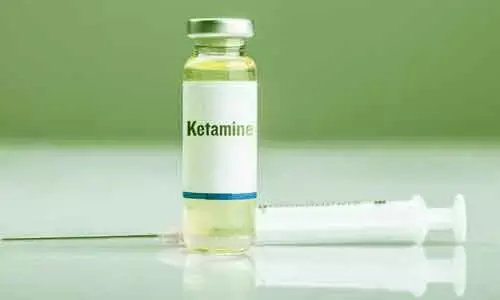- Home
- Medical news & Guidelines
- Anesthesiology
- Cardiology and CTVS
- Critical Care
- Dentistry
- Dermatology
- Diabetes and Endocrinology
- ENT
- Gastroenterology
- Medicine
- Nephrology
- Neurology
- Obstretics-Gynaecology
- Oncology
- Ophthalmology
- Orthopaedics
- Pediatrics-Neonatology
- Psychiatry
- Pulmonology
- Radiology
- Surgery
- Urology
- Laboratory Medicine
- Diet
- Nursing
- Paramedical
- Physiotherapy
- Health news
- Fact Check
- Bone Health Fact Check
- Brain Health Fact Check
- Cancer Related Fact Check
- Child Care Fact Check
- Dental and oral health fact check
- Diabetes and metabolic health fact check
- Diet and Nutrition Fact Check
- Eye and ENT Care Fact Check
- Fitness fact check
- Gut health fact check
- Heart health fact check
- Kidney health fact check
- Medical education fact check
- Men's health fact check
- Respiratory fact check
- Skin and hair care fact check
- Vaccine and Immunization fact check
- Women's health fact check
- AYUSH
- State News
- Andaman and Nicobar Islands
- Andhra Pradesh
- Arunachal Pradesh
- Assam
- Bihar
- Chandigarh
- Chattisgarh
- Dadra and Nagar Haveli
- Daman and Diu
- Delhi
- Goa
- Gujarat
- Haryana
- Himachal Pradesh
- Jammu & Kashmir
- Jharkhand
- Karnataka
- Kerala
- Ladakh
- Lakshadweep
- Madhya Pradesh
- Maharashtra
- Manipur
- Meghalaya
- Mizoram
- Nagaland
- Odisha
- Puducherry
- Punjab
- Rajasthan
- Sikkim
- Tamil Nadu
- Telangana
- Tripura
- Uttar Pradesh
- Uttrakhand
- West Bengal
- Medical Education
- Industry
Ketamine an effective alternative for sedation, pain management in ICU patients

USA: The use of continuous infusion (CI) ketamine increases the time spent in goal pain and sedation score range with no effect on delirium incidence, a recent study has suggested. This decreases the need for opioids, benzodiazepines, and other analgesics.
The findings of the study, presented at the Society of Critical Care Medicine's 49th Annual Critical Care Congress in Orlando, indicates that CI ketamine could be a reliable alternative for intensive care unit (ICU) patients.
The Ketamine-ICU study by Christine Groth, PharmD, Clinical Pharmacy Coordinator of the University of Rochester Medical Center, and colleagues, was designed to address the lack of guidance as to how to use ketamine in the ICU.
The study was a multicenter, retrospective study that evaluated a cohort of 390 adult ICU patients from 25 institutions from 2014-2017. The mean age of the study population was 52 years, median APACHE II score was 21, mean length of stay in ICU was 9 days, and mean length of hospital stay was 15 days.
Investigators hypothesized a continuous infusion of ketamine would lead to an increased proportion of time spent in goal pain and sedation score range, reduced exposure to other sedatives, and variable effects on delirium.
For the purpose of the analysis, pain and sedation scores and delirium screenings in the 24 hours prior to ketamine were compared to scores and screenings in the first 24 hours and 25 to 48 hours following ketamine administration.
Read Also: Ketamine use can prevent postanesthetic shivering without severe side effects
Key findings of the study include:
- A significant increase in median time spent within goal pain score range after ketamine initiation (24H prior: 68.9% [66.7-72.6%], first 24H: 78.6% [74.3-82.5%], 25-48H: 80.3% [74.6-84.3%]).
- Results also indicated there was a significant increase in median time spent within goal sedation score range after ketamine initiation (24H prior: 57.1% [52.5%-60%], first 24H: 64.1% [60.7-67.2%], 25-48H: 68.9% [65.5-79.5%]).
- there was no difference in median time spent delirious after ketamine initiation (24H prior: 43.0% [17.0-47.0%], first 24H: 39.5% [27.0-43.8%], 25-48H: 0% [0-43.7%]).
- Ketamine was associated with a significant reduction in opioid, benzodiazepine, propofol and dexmedetomidine requirements.
- Eighty percent of patients were mechanically ventilated and in a fair amount of these patients ketamine was continued through the extubation period.
- 5.7% of participants discontinued participation due to adverse effects.
- Adverse effects observed in participants included increased secretions, which occurred in 10% of patients, and resulted in increased anticholinergic use.
- Psychotropic effects were recorded in just 4.6% of patients.
"We definitely need prospective randomized comparative data to really determine its place in therapy as well as the overall safety of this medication," concluded the authors.
Read Also: Vitamin C may shorten mechanical ventilation duration in critical care patients
This study, "Effects of Ketamine on Pain, Sedation, and Delirium in the Intensive Care Unit (KETAMINE-ICU Study)," was presented at CCC 49 in Orlando, FL and published in the journal Critical Care Medicine.
Dr Kamal Kant Kohli-MBBS, DTCD- a chest specialist with more than 30 years of practice and a flair for writing clinical articles, Dr Kamal Kant Kohli joined Medical Dialogues as a Chief Editor of Medical News. Besides writing articles, as an editor, he proofreads and verifies all the medical content published on Medical Dialogues including those coming from journals, studies,medical conferences,guidelines etc. Email: drkohli@medicaldialogues.in. Contact no. 011-43720751


